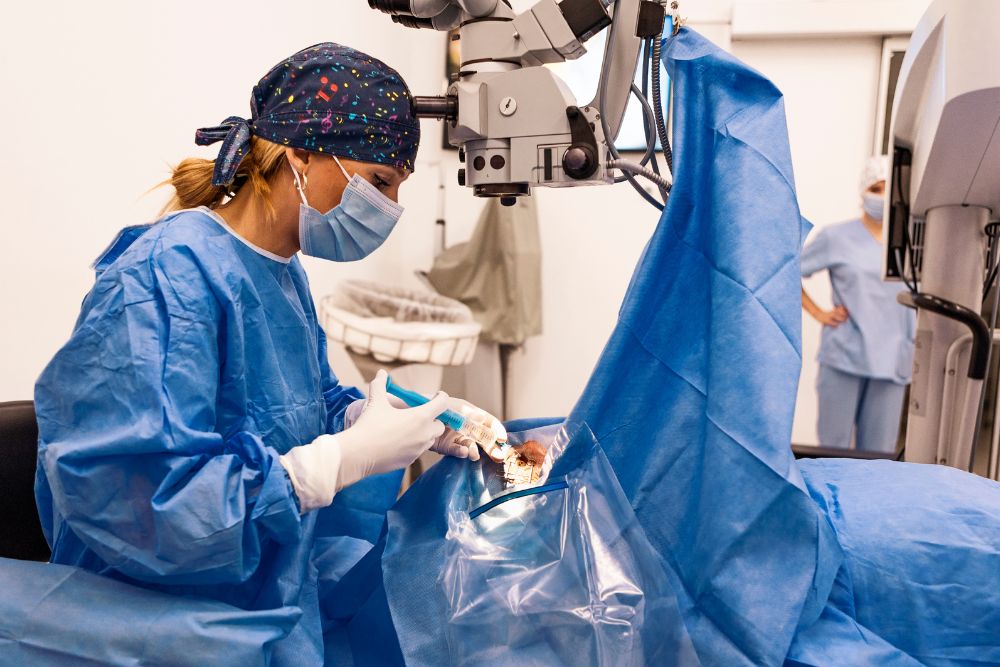Surgical Options for Repairing Retinal Tears and Detachments

A retinal tear or detachment can be treated with various surgical procedures, depending on the severity and location of the tear. When a retinal detachment goes untreated, it can result in permanent vision loss. Below are some of the most common surgical treatments used to repair these tears and reattach the retina.
What Are Retinal Tears and Detachments?
The retina is the light-sensitive tissue located at the back of the eyeball that triggers nerve impulses that travel to the brain via the optic nerve. This is how visual images are formed.
A retinal tear is an emergency medical condition involving a portion of the retina that has separated or detached from the underlying tissue. Retinal tears can create a gap between the retina and the layers located underneath the retina, and if not treated promptly, this gap could progress to a detachment of the retina, potentially causing vision loss.
Early Signs and Symptoms of Retinal Tears and Detachments
Early symptoms of retinal tears and detachments are the same and often develop quickly:
- The sudden onset of “floaters” (i.e., small dark spots that appear to move across your field of vision)
- Flashes of light
- Blurred or distorted vision
As symptoms progress, experiencing the sensation of a curtain-like shadow that appears over the visual field may indicate that the retina is detaching. If you experience symptoms of retinal tears, emergency medical treatment is necessary; an eye care specialist should be contacted immediately to determine which type of surgical or laser procedure is needed.
Surgical Options for Repairing Retinal Tears and Detachments
There are several factors the retina specialist considers when selecting the type of surgical treatment to repair a retinal tear or detachment. These factors include the size of the retinal tear and where it is located, the severity of the retinal detachment, and the preference of the ophthalmologist.
Pneumatic Retinopexy
Retinal detachments that are small and uncomplicated are often treated with pneumatic retinopexy. The procedure involves a gas bubble injected into the vitreous body (i.e., the clear gel-like substance located between the eye's lens and retina). The bubble pushes against the detached retina, helping it reattach. Next, cryopexy (laser freezing) is used to seal the retinal tear.
Cryotherapy
A treatment that utilizes extreme cold to create scar tissue around the retinal tear, sealing it and reattaching the retina.
Laser therapy
Retinal tears may be repaired with laser photocoagulation which uses a laser to create minor burns around the retinal tear. These burns produce scar tissue, which seals the retinal tear and prevents further detachment.
Vitrectomy
A vitrectomy is a surgical procedure in which part or all of the vitreous is removed to provide direct access to the retina and nearby structures. This procedure is minimally invasive and usually causes only mild discomfort. After the vitreous is removed, the retina specialist can repair any retinal tears or remove scar tissue that may be pulling on the retina. Once the retinal repair is complete, the vitreous is replaced with either a silicone oil bubble or gas to allow the eye to heal.
Scleral Buckle
A scleral buckle surgical procedure is very effective in repairing retinal detachments. The procedure involves a special band placed around the eye. The band functions to move the affected retina back into contact with the back wall of the eye. A scleral buckle procedure is often performed along with another treatment to fix any other retinal breaks or weakened areas. A vitrectomy is often performed at the same time as a scleral buckle procedure.
Advanced Care for Retinal Tears and Detachments
Retinal tears and detachments are considered medical emergencies and prompt surgical intervention is required to prevent permanent vision loss. Seek immediate medical attention if you suspect you have a retinal tear or detachment. For retina-related emergencies in Georgia or South Carolina, please call The Retina Eye Center at (706) 481-9191.
